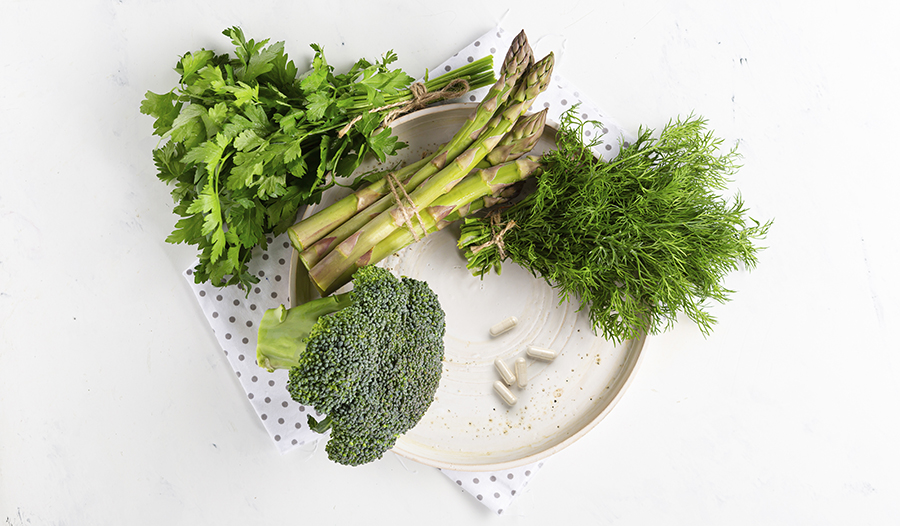Can Betaine HCL Help With Low Stomach Acid and Improve Digestion?

The manufacture and secretion of hydrochloric acid (HCL) by the stomach is critical to the digestive process. It is also one of the key mechanisms to prevent unwanted bacteria, viruses, yeast, and other organisms from entering the body.
Sometimes, for a variety of different reasons, a person may not secrete enough hydrochloric acid. For example, aging is a big factor as nearly four out of ten over the age of 40 have some degree of deficiency of gastric acid secretion.1 In fact, lack of HCL secretion in the stomach is one of the most common causes of indigestion, bloating or burping after a meal, and malabsorption of nutrients.
Supplementing with betaine HCL at meals can make up the difference and go a long way in improving indigestion when there is an insufficient output of stomach acid.
What is Betaine?
Betaine is an unofficial member of the B vitamin family. Technically, it is not a vitamin because the body can manufacture betaine. Still, it works closely with other B vitamins in various body functions, such as liver function, cell replication, and biochemical processes.2 Betaine supplementation is approved by the US Food and Drug Administration (FDA) to treat a genetic disorder of homocysteine metabolism.
A key gastrointestinal benefit of betaine is improving the health of the intestinal lining.2 Specifically, betaine helps preserve and support the barrier function of the cells that line the intestine to fight the “leaky gut.” Betaine improves the intestinal barrier by increasing the production of proteins that maintain the tight junction between cells.
Food Sources of Betaine
- Beets
- Broccoli
- Shellfish
- Spinach and other green leafy vegetables
- Whole grains
What is Betaine HCL?
HCL is extremely acidic. Pure HCL would eat a hole into your mouth or throat if you tried to take it in an unbound form. Betaine HCL is a safe supplemental form of both betaine and HCL. Betaine HCL delivers the hydrochloric acid to the stomach, where specialized cells and compounds lining the stomach protect the very strong acid from causing any damage.
The Importance of HCL in the Stomach
The stomach is designed to be extremely acidic when empty. Its pH ranges from 1.5-2.5. When challenged with a meal, the stomach cells churn out more HCL along with a protein-digesting enzyme known as pepsin. This combination is really important in breaking down ingested proteins and destroying ingested microorganisms like bacteria, viruses, and yeast.3
Sufficient HCL secretion is needed to properly absorb vitamin B12, folate, vitamin C, iron, and some forms of calcium, magnesium, and zinc.
How Do You Know if Your Stomach is Secreting Enough HCL?
While there are specialized tests that measure stomach pH, minor stomach acid insufficiency can be determined by common symptoms. People with low stomach output often experience discomfort almost immediately when food hits the stomach or soon after eating a meal. The indigestion is most often experienced as a sense of fullness, bloating, belching, nausea, or cramping. Also, since HCL is critical to protein digestion and mineral assimilation, low HCL production is often associated with weak, peeling, and cracked fingernails.
How to Supplement With Betaine HCL
Most often, betaine HCL products also include pepsin, a protein-digesting enzyme or protease. Pepsin is either derived from pig stomachs or provided in the form of vegan proteases with pepsin-like activity. The starting dosage of these combination products or betaine HCL is one capsule supplying 500 mg Betaine HCL with each meal.
Some physicians utilize a challenge to tailor the dosage for the individual. This simply involves taking an increasing number of capsules with each subsequent meal until there is a feeling of warmth or discomfort in the stomach. When that occurs, go back to the previously used dosage. That is the maintenance dosage for that size meal. For larger meals, you may need to increase the number of capsules by one. For smaller meals, decrease the number.
- You will need to take less at smaller meals.
- When taking several capsules, it is best to take them throughout the meal.
- As your stomach begins to regain the ability to produce the amount of HCL needed to properly digest your food, you will notice the warm feeling again and will have to cut down the dose level.
Safety and Side Effects
Cautions: Do not take HCL on an empty stomach. Consult a health care practitioner before use if suffering from active peptic ulcer, during pregnancy, or while breastfeeding. Keep out of reach of children.
Side Effects: May cause mild gastrointestinal side effects such as nausea and stomach upset.
References:
- Howden CW, Hunt RH. Spontaneous hypochlorhydria in man: possible causes and consequences. Digestive Diseases 1986;4(1):26–32.
- Arumugam MK, Paal MC, Donohue TM Jr, et al. Beneficial Effects of Betaine: A Comprehensive Review. Biology (Basel). 2021 May 22;10(6):456.
- Schubert ML. Functional anatomy and physiology of gastric secretion. Curr Opin Gastroenterol. 2015 Nov;31(6):479-85.
DISCLAIMER:This Wellness Hub does not intend to provide diagnosis...
















































































 Table of Contents
Table of Contents
















